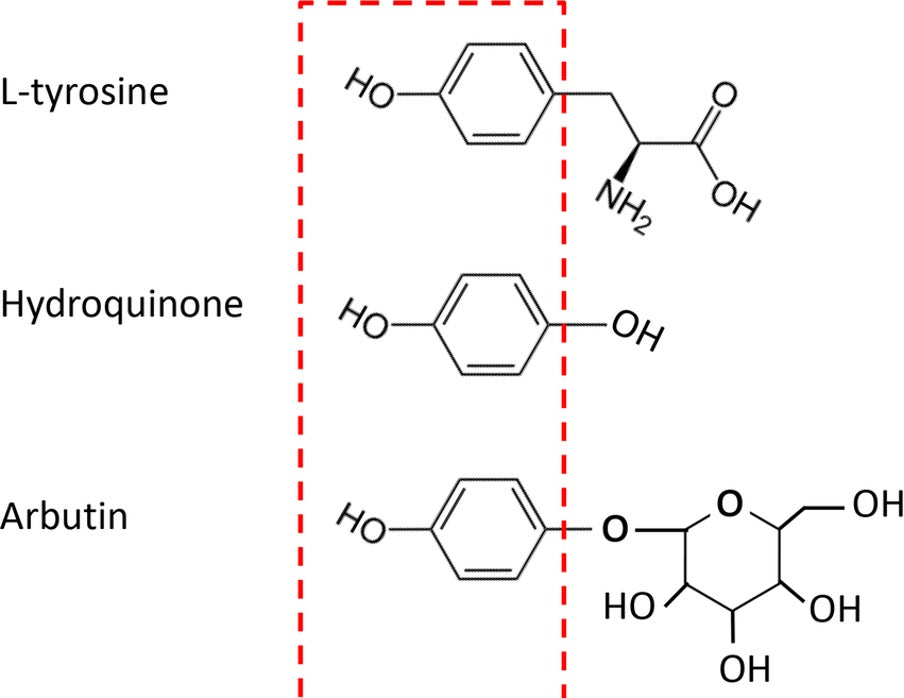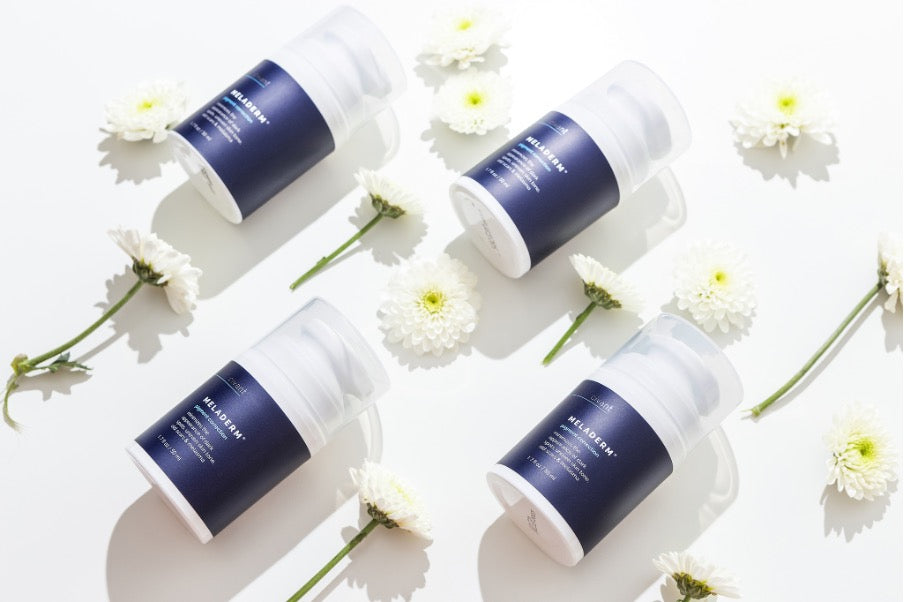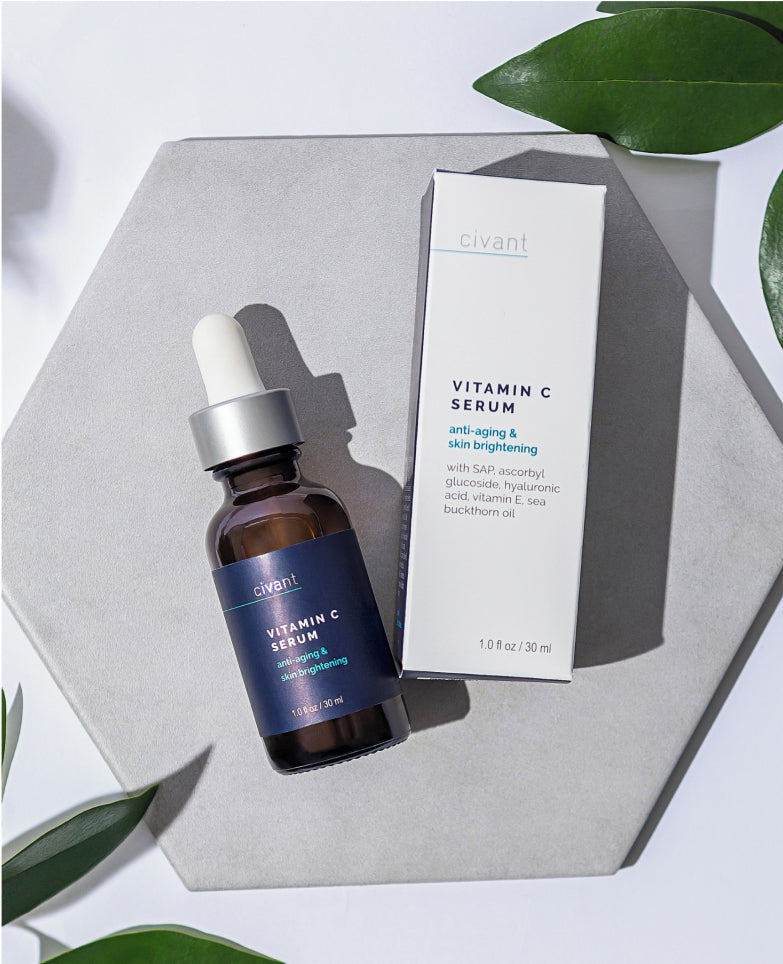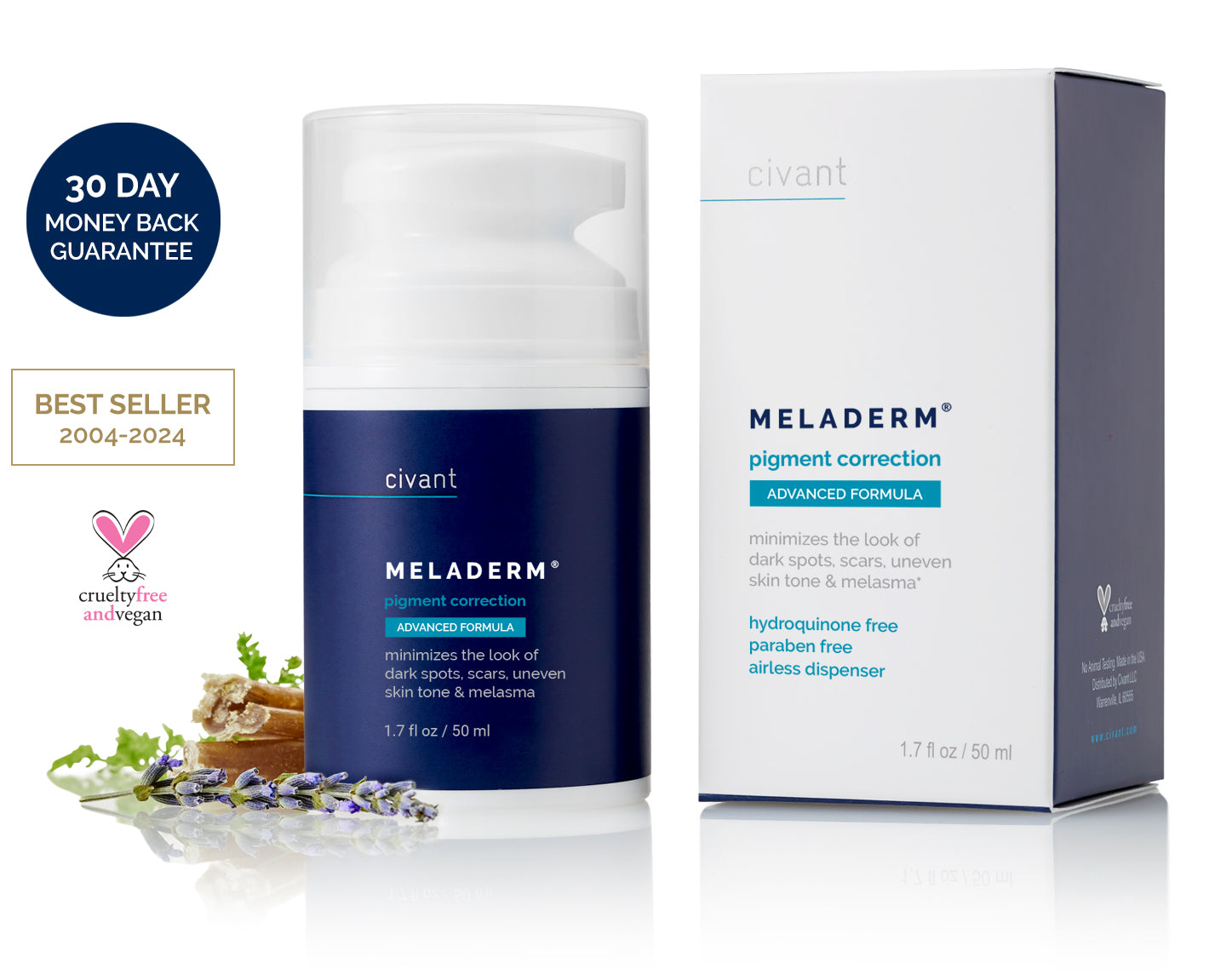Picture yourself getting ready to leave the house. You don’t reach for the makeup bag to conceal your acne scars or hyperpigmentation spots. You don’t need to. Instead, you confidently walk out the door, fresh-faced and clear-skinned.
That’s a key benefit of using the safe skin brightening agent, alpha arbutin. It delivers all the spot fading properties minus the potentially problematic side effects of hydroquinone. Whether your hyperpigmentation is hormonal or caused by sun exposure or acne, you can benefit from the gentle, skin-safe action of alpha arbutin.
To help you better understand alpha arbutin, we’ll break down:
- What alpha arbutin is and how it diminishes hyperpigmentation
- How to get the best out of alpha arbutin through your skin care regimen
- Why it’s a safe skin brightening agent and which alpha arbutin product is best
What Is Alpha Arbutin?
Alpha arbutin is a naturally occurring antioxidant derived from the leaves of the bearberry. It’s also found in smaller quantities in plant varieties of blueberry, cranberry, mulberry and pear.
Alpha arbutin and hydroquinone share a structural similarity with the protein tyrosine, which is key to melanin production and to the function of skin brighteners. We’ll talk about how alpha arbutin works a little later. But for now, the image below will give you a clearer idea of the similarities and differences between the two skin brightening ingredients.
Why Is Alpha Arbutin a Safe Skin Brightener?
The secret to alpha arbutin’s effectiveness lies in how it works: deactivating, instead of destroying, melanin-producing structures. In the following table, we compare the differences between hydroquinone and alpha arbutin.
|
Alpha Arbutin |
Hydroquinone |
|
Doesn’t affect viability of melanin-producing cells |
Degrades and destroys melanin-producing cells |
|
Has anti-inflammatory and antioxidant properties |
Triggers an inflammatory response in the skin |
|
Blocks the maturation of pigment-storing structures (and the release of melanin to the surface skin) without degrading them |
Degrades and clusters the pigment storing structures within skin cells |
|
Doesn’t cause permanent discoloration |
May cause permanent skin discoloration (ochronosis) even with monitored usage |
|
Doesn’t damage melanin-producing structures |
May cause total loss of melanin in the skin (leukoderma) |
|
Has potential anticarcinogenic activity |
May be cancer-causing as it damages DNA in the skin and causes melanin loss |
So, the takeaway here is that the structural similarities between alpha arbutin and hydroquinone are minimal, and their functions are vastly different. Alpha arbutin is gentle on the skin. Hydroquinone, on the other hand, could be compared to killing a mosquito with a sledgehammer.
Expert Fact: You might be familiar with kojic acid and Vitamin C as effective skin brightening ingredients. Alpha arbutin has a more potent ability to block melanin production than both Vitamin C and kojic acid.
How Does Alpha Arbutin Work?

Simply put, alpha arbutin diminishes the appearance of hyperpigmentation by blocking the pathway your skin uses to create pigment (melanin). This is more effective long-term than exfoliating peels and other surface serums, which don’t target the source of the melanin.
Melanin plays a key role in:
- Protecting your skin by absorbing harmful ultraviolet light rays
- Helping your skin maintain stability against environmental changes
- Scavenging free radicals and protecting your skin cells from oxidative stress
Basically, your skin produces melanin as a part of its scheduled maintenance. With hyperpigmentation, melanin production is on hyper-drive and the only way to reduce discoloration is to target the melanin production itself. This is where alpha arbutin comes in.
We need to get a little technical here, but we’ll keep it simple. A key player in the production of melanin is an enzyme called tyrosinase. Tyrosinase regulates the conversion of the tyrosine amino acid to L-DOPA, the precursor of melanin. Therefore, in the same way that the police pull over anyone going who’s up to no good, alpha arbutin binds with and makes the tyrosinase enzyme inactive. As a result, you get reduced melanin production and a diminished appearance of dark spots and hyperpigmentation.
Expert Tip: Exfoliating with mild acids, such as glycolic or salicylic acids, 1–3 times a week will break down the pigmented cells on your skin's surface and may help accelerate the reduction of hyperpigmentation.
How Should You Use Alpha Arbutin?
First things first, as with all skin care:
- Read and follow package instructions carefully.
- Consult your dermatologist before trying any new product or for long-term use.
- Do a patch test on a small hidden area, like under the jaw or behind the ear.
Now that we’ve got the basics out of the way, here are some tips to get the best out of your alpha arbutin serum:
- Apply it once in the morning and once at night after cleansing and drying your skin, but before applying moisturizer.
- Work the product into the skin until fully absorbed and remember to be gentle as damaging the skin causes more hyperpigmentation.
- Use a broad-spectrum sunscreen, SPF 30 or higher, to protect you from both UVA and UVB rays, which activate tyrosinase and worsen hyperpigmentation.
- Replenish your sunscreen throughout the day.
- Avoid excessive exposure to sunlight, tanning beds, sun lamps and heat sources.
Great skincare takes a multi-pronged approach to reducing hyperpigmentation. Look for products that do more than correct pigmentation.
Expert Tip: We can’t stress the use of sunscreen enough. Remember, with the use of alpha arbutin you’re reducing the amount of melanin in your skin. Therefore, you need to be extra careful about sun exposure. For best results, you need to be religious in your use of sunscreen to prevent new hyperpigmentation spots from forming or exacerbating the old ones.
What Is the Best Alpha Arbutin Product?

Effective skincare products are more of a symphony than a solo performance. You need to choose ingredients that are clean, natural and that work well together. That’s why Meladerm is the best alpha arbutin serum on the market.
Keep in mind that as you apply your alpha arbutin, you’ll want the other skin care ingredients to:
- Block melanin production to reduce hyperpigmentation
- Scavenge free radicals and prevent oxidative skin damage, which worsens hyperpigmentation
- Reduce inflammation and infection (breakouts), a huge trigger for post-inflammatory hyperpigmentation
- Keep your skin supple and moisturized and prevent dry skin, which can lead to cracking, rashes and scarring
- Stimulate new skin growth and maintenance by promoting collagen and keratin production
Let’s dig a little deeper into how Meladerm incorporates all of these elements and works so well in reducing the appearance of hyperpigmentation. In this table, we’ll categorize and compare some of the benefits of Meladerm’s ingredients.
|
Ingredient Category |
Meladerm Ingredients |
Benefit of Ingredients to the Skin |
|
Tyrosinase Inhibitors |
Alpha arbutin Green tea Sepiwhite™ Licorice root Azelaic acid Vitamin C |
Inhibits the action of tyrosinase in melanin production |
|
Kojic acid |
Blocks tyrosinase activation by visible light |
|
|
Antioxidant/Anti-inflammatory |
SymWhite® Almond extract Ginger root extract Sea buckthorn fruit Emblica fruit extract Vitamin E |
Antioxidant properties scavenge free radicals and prevent inflammation |
|
Is an antioxidant and also kills bacteria |
||
|
Anti-wrinkle/Skin Rejuvenating |
Vitamin C ArgirelineⓇ |
Stimulate collagen production and plump up skin |
|
Hyaluronic acid |
Natural lubricant that makes skin flexible |
|
|
Niacinamide |
Helps skin build a keratin and lipid barrier to stay firm, healthy and moisturized
Prevents transfer of existing melanin from melanocytes to surface skin cells |
|
|
Moisturizers |
Squalane Cacao seed butter Argan oil |
Skin emollient that keeps skin from drying out |
”I first developed melasma after tanning bed overuse … worsened in pregnancy. I’ve used a dermatologist-prescribed treatment that worked until it rebounded and worsened. Meladerm has been amazing. Melasma is once again almost gone.”
— Keleigh D., ⭐⭐⭐⭐⭐ Verified Civant Buyer
Get Started On Your Journey to Even-Toned Skin
We’ve seen that alpha arbutin works really well to reduce hyperpigmentation without causing permanent damage to your skin. After all, you still want the melanin in your skin to do its other protective jobs for the rest of your life.
Get started on healthier, even-toned skin with Meladerm, a cruelty-free, vegan pigment correction product. It has all the great benefits we’ve discussed and contains no hydroquinone, parabens, sulfates, phthalates, or mineral oil. You’ll feel good about using it and your skin will feel amazing.



